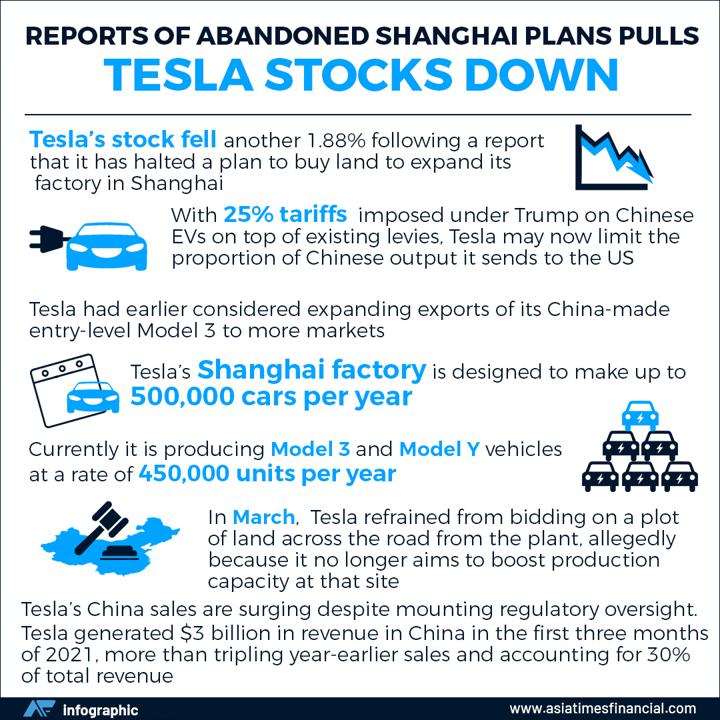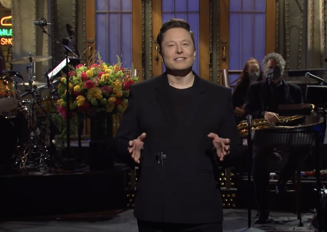Tesla founder Elon Musk boosted dogecoin with a tweet, but reports of abandoned Shanghai plans pushed Tesla’s own stock down further
If Elon Musk was trying to reverse the effect on the price of dogecoin of his SNL appearance, he had limited success with a tweet on Tuesday. Tesla's own stock continued its downward move. File picture: Reuters.
(ATF) Tesla founder Elon Musk tweeted a query about whether the firm should accept dogecoin, giving the cryptocurrency a 20% boost, but Tesla’s own stock fell further on a report it has abandoned plans to expand in Shanghai.
Musk’s tweeted question about whether Tesla should accept dogecoin, the cryptocurrency that began as a joke, brought over 3 million responses from his 54 million followers and gave the token an initial boost of 20% from its price at the time of the tweet of 46 cents.
The spike in the value of dogecoin faded later in the day, however, and did not have a net effect comparable to his comment in a sketch on the US TV show SNL on May 8 that the token was a “hustle”, which contributed to a fall of roughly 30% from a recent high that at one point had its capitalisation at around $95 billion.
Tesla’s own stock fell another 1.88% on Tuesday May 11 – after a bruising dip of 6.4% on Monday – following a report that it has halted a plan to buy land to expand its Shanghai plant as part of a move to create a global export hub.
Reuters reported that with 25% tariffs on imported Chinese electric vehicles imposed on top of existing levies under former President Donald Trump still in place, Tesla now intends to limit the proportion of Chinese output in its global production.
Tesla is walking a reputational tightrope in China – the biggest market in the world for electric vehicles – so any perception that it is scaling back commitment to the country could be harmful, even if it is simply reworking its expansion plans.
Tesla had earlier considered expanding exports of its China-made entry-level Model 3 to more markets, including the United States, sources told Reuters, a plan that had not previously been reported.
Tesla currently ships China-made Model 3s to Europe, where it is building a factory in Germany that has itself been delayed by at least six months from a planned launch in July.
Tesla’s Shanghai factory is designed to make up to 500,000 cars per year, and is currently producing Model 3 and Model Y vehicles at a rate of 450,000 units per year.
In March, Tesla refrained from bidding on a plot of land across the road from the plant as it no longer aimed to boost China production capacity significantly, at least for now, sources said.
In a statement to Reuters, Tesla said its Shanghai factory was “developing as planned”.
The Shanghai city government, a key supporter in Tesla’s establishment of a wholly-owned factory in China – the first and only foreign passenger car plant not required to form a joint venture – did not respond to a request for comment.
Tesla had never declared an intention to acquire the land, which is about half the size of the 200-acre (80 hectare) plot housing Tesla’s current facility and would enable the company to lift capacity by another 200,000 to 300,000 cars, two sources said.
Tesla’s China sales are surging despite mounting regulatory pressure in the country after consumer disputes over product safety and scrutiny over how it handles data.

(ATF) Tesla founder Elon Musk tweeted a query about whether the firm should accept dogecoin, giving the cryptocurrency a 20% boost, but Tesla’s own stock fell further on a report it has abandoned plans to expand in Shanghai.
Musk’s tweeted question about whether Tesla should accept dogecoin, the cryptocurrency that began as a joke, brought over 3 million responses from his 54 million followers and gave the token an initial boost of 20% from its price at the time of the tweet of 46 cents.
The spike in the value of dogecoin faded later in the day, however, and did not have a net effect comparable to his comment in a sketch on the US TV show SNL on May 8 that the token was a “hustle”, which contributed to a fall of roughly 30% from a recent high that at one point had its capitalisation at around $95 billion.
Tesla’s own stock fell another 1.88% on Tuesday May 11 – after a bruising dip of 6.4% on Monday – following a report that it has halted a plan to buy land to expand its Shanghai plant as part of a move to create a global export hub.
Reuters reported that with 25% tariffs on imported Chinese electric vehicles imposed on top of existing levies under former President Donald Trump still in place, Tesla now intends to limit the proportion of Chinese output in its global production.
Tesla is walking a reputational tightrope in China – the biggest market in the world for electric vehicles – so any perception that it is scaling back commitment to the country could be harmful, even if it is simply reworking its expansion plans.
Tesla had earlier considered expanding exports of its China-made entry-level Model 3 to more markets, including the United States, sources told Reuters, a plan that had not previously been reported.
Tesla currently ships China-made Model 3s to Europe, where it is building a factory in Germany that has itself been delayed by at least six months from a planned launch in July.
Tesla’s Shanghai factory is designed to make up to 500,000 cars per year, and is currently producing Model 3 and Model Y vehicles at a rate of 450,000 units per year.
In March, Tesla refrained from bidding on a plot of land across the road from the plant as it no longer aimed to boost China production capacity significantly, at least for now, sources said.
In a statement to Reuters, Tesla said its Shanghai factory was “developing as planned”.
The Shanghai city government, a key supporter in Tesla’s establishment of a wholly-owned factory in China – the first and only foreign passenger car plant not required to form a joint venture – did not respond to a request for comment.
Tesla had never declared an intention to acquire the land, which is about half the size of the 200-acre (80 hectare) plot housing Tesla’s current facility and would enable the company to lift capacity by another 200,000 to 300,000 cars, two sources said.
Tesla’s China sales are surging despite mounting regulatory pressure in the country after consumer disputes over product safety and scrutiny over how it handles data.

Adding capacity in Shanghai
It generated $3 billion in revenue in China in the first three months of this year, more than tripling year-earlier sales and accounting for 30% of total revenue.
Construction documents posted on a government website in March show Tesla is revamping its plant in Shanghai to add capacity.
Tesla still has land, designed for production but now used for parking, at its Shanghai site. One of the people said Tesla could expand its capacity beyond 500,000 on its existing site. Another said Tesla may acquire more land for more car production lines in the future.
Separately, Tesla is building facilities to repair and reproduce key components such as electric motors and battery cells and build electric vehicle chargers at its Shanghai plant.
The Shanghai government has been talking to several companies to sell the land for new-energy commercial vehicle production, said a person with direct knowledge of the matter.
Tesla faces intensifying competition in China from domestic players such as Nio, which is considering making mass market products under another marque.
Even before the trade war tariffs, relatively few China-made cars were shipped to the United States.
General Motors sells its China-made Buick Envision in the United States, paying the additional 25% tariff, but the SUV is not a high volume model.
It generated $3 billion in revenue in China in the first three months of this year, more than tripling year-earlier sales and accounting for 30% of total revenue.
Construction documents posted on a government website in March show Tesla is revamping its plant in Shanghai to add capacity.
Tesla still has land, designed for production but now used for parking, at its Shanghai site. One of the people said Tesla could expand its capacity beyond 500,000 on its existing site. Another said Tesla may acquire more land for more car production lines in the future.
Separately, Tesla is building facilities to repair and reproduce key components such as electric motors and battery cells and build electric vehicle chargers at its Shanghai plant.
The Shanghai government has been talking to several companies to sell the land for new-energy commercial vehicle production, said a person with direct knowledge of the matter.
Tesla faces intensifying competition in China from domestic players such as Nio, which is considering making mass market products under another marque.
Even before the trade war tariffs, relatively few China-made cars were shipped to the United States.
General Motors sells its China-made Buick Envision in the United States, paying the additional 25% tariff, but the SUV is not a high volume model.

No comments:
Post a Comment